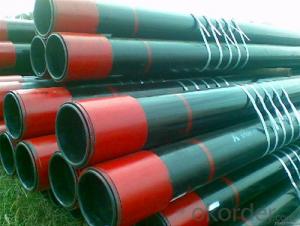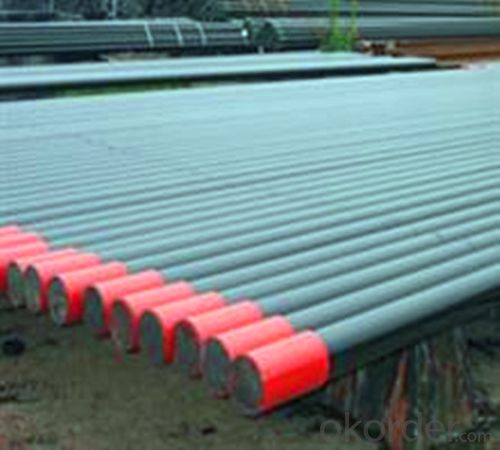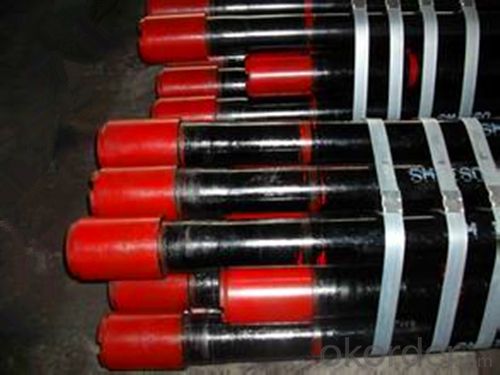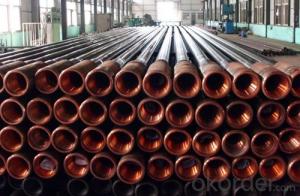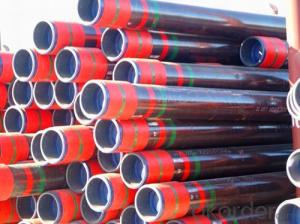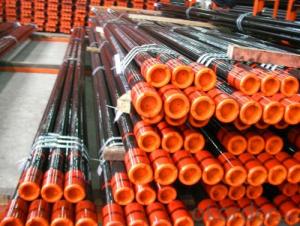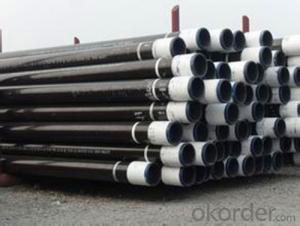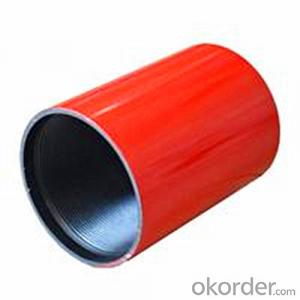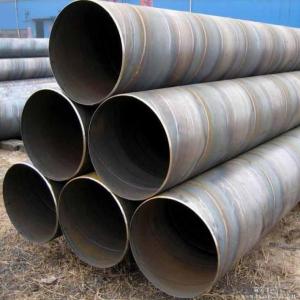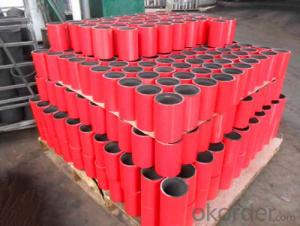Casing Pipe of Grade N80 with API Standard
- Loading Port:
- Qingdao
- Payment Terms:
- TT OR LC
- Min Order Qty:
- 20 m.t.
- Supply Capability:
- 2000 m.t./month
OKorder Service Pledge
OKorder Financial Service
You Might Also Like
1. Structure of Casing Pipe of Grade N80 Description
API 5CT Steel Pipe, N80Q Oil/Petroleum Casing Pipe, OCTG
1) Grade: J55,K55,L80,N80Q,C90,T95,P110
2) Size: 4 1/2", 5", 5 1/2", 6 5/8", 7", 7 5/8", 9 5/8", 10 3/4", 13 3/8", 16", 18 5/8", 20"
3) Wall thickness: 6.35 - 12.70 mm
4) Thread type: STC, LTC, BTC
5) Length: R1,R2,R3
6) All our casings accord with API 5CT standard.
2. Main Features of Casing Pipe of Grade N80
1) Advanced test for quality
2) MTC, COC provided
3) Supervision is welcome
3. Casing Pipe of Grade N80 Images
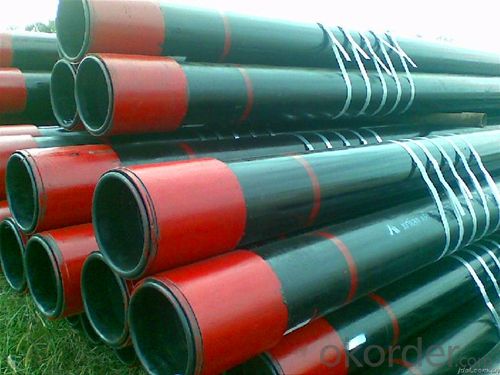
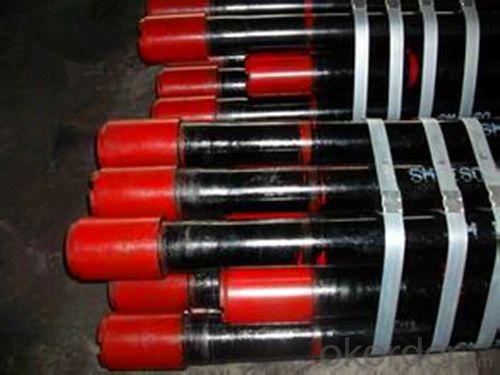
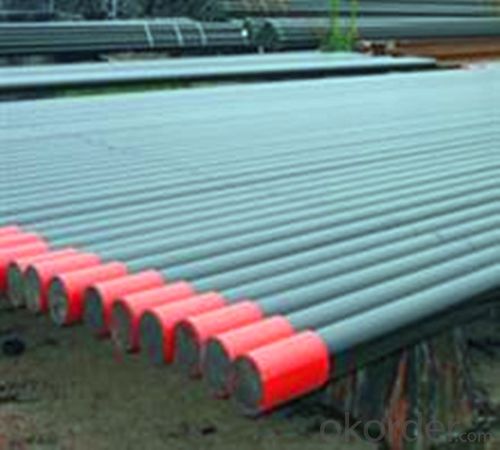
4. Casing Pipe of Grade N80 Specification
Size Destination | Weight Destination | Outside Diameter | Wall Thickness | Type of End Finish | ||||||
Grade | ||||||||||
in | mm | in | mm | J55 | L80 | N80 | C90 | P110 | ||
4 1/2 | 9.50 | 4.500 | 114.3 | 0.205 | 5.21 | PS | - | - | - | - |
10.50 | 0.224 | 5.69 | PSB | - | - | - | - | |||
11.60 | 0.250 | 6.35 | PSLB | PLB | PLB | PLB | PLB | |||
13.50 | 0.290 | 7.37 | - | PLB | PLB | PLB | PLB | |||
15.10 | 0.337 | 9.56 | - | - | - | - | PLB | |||
5 | 11.50 | 5.00 | 127.00 | 0.220 | 5.59 | PS | - | - | - | - |
13.00 | 0.253 | 6.43 | PSLB | - | - | - | - | |||
15.00 | 0.296 | 7.52 | PSLB | PLB | PLB | PLBE | PLB | |||
18.00 | 0.362 | 9.19 | - | PLB | PLB | PLBE | PLB | |||
21.40 | 0.437 | 11.10 | - | PLB | PLB | PLB | PLB | |||
23.20 | 0.478 | 12.14 | - | PLB | ||||||
24.10 | 0.500 | 12.70 | - | PLB | ||||||
5 1/2 | 14.00 | 5.500 | 139.7 | 0.244 | 6.20 | PS | - | - | - | - |
15.50 | 0.275 | 6.98 | PSLB | - | - | - | - | |||
17.00 | 0.304 | 7.72 | PSLB | PLB | PLB | PLBE | PLB | |||
20.00 | 0.361 | 9.17 | - | PLB | PLB | PLBE | PLB | |||
23.00 | 0.415 | 10.54 | - | PLB | PLB | PLBE | PLB | |||
6 5/8 | 20.00 | 6.625 | 168.28 | 0.288 | 7.32 | PSLB | - | - | - | - |
24.00 | 0.352 | 8.94 | PSLB | PLB | PLB | PLBE | PLB | |||
28.00 | 0.417 | 10.59 | - | PLB | PLB | PLBE | PLB | |||
32.00 | 0.475 | 12.06 | - | PLB | PLB | PLBE | PLB | |||
7 | 17.00 | 7.00 | 177.80 | 0.231 | 5.87 | - | - | - | - | - |
20.00 | 0.272 | 6.91 | PS | - | - | - | - | |||
23.00 | 0.317 | 8.05 | PSLB | PLB | PLB | PLBE | - | |||
26.00 | 0.362 | 9.19 | PSLB | PLB | PLB | PLBE | PLB | |||
29.00 | 0.408 | 10.36 | - | PLB | PLB | PLBE | PLB | |||
32.00 | 0.453 | 11.51 | - | PLB | PLB | PLBE | PLB | |||
35.00 | 0.498 | 12.65 | - | PLB | PLB | PLBE | PLB | |||
38.00 | 0.540 | 13.72 | - | PLB | PLB | PLBE | PLB | |||
7 5/8 | 24.00 | 7.625 | 193.68 | 0.300 | 7.62 | - | - | - | - | - |
26.40 | 0.328 | 8.33 | PSLB | PLB | PLB | PLBE | PLB | |||
29.70 | 0.375 | 9.52 | - | PLB | PLB | PLBE | PLB | |||
33.70 | 0.430 | 10.92 | - | PLB | PLB | PLBE | PLB | |||
39.00 | 0.500 | 12.70 | - | PLB | PLB | PLBE | PLB | |||
42.80 | 0.562 | 14.27 | - | PLB | PLB | PLB | PLB | |||
45.30 | 0.595 | 15.11 | - | PLB | PLB | PLB | PLB | |||
47.10 | 0.625 | 15.88 | - | PLB | PLB | PLB | PLB | |||
8 5/8 | 24.00 | 8.625 | 219.08 | 0.264 | 6.71 | PS | - | - | - | - |
28.00 | 0.304 | 7.72 | - | - | - | - | - | |||
32.00 | 0.352 | 8.94 | PSLB | - | - | - | - | |||
36.00 | 0.400 | 10.16 | PSLB | PLB | PLB | PLBE | PLB | |||
40.00 | 0.450 | 11.43 | - | PLB | PLB | PLBE | PLB | |||
44.00 | 0.500 | 12.70 | - | PLB | PLB | PLBE | PLB | |||
49.00 | 0.557 | 14.15 | - | PLB | PLB | PLBE | PLB | |||
9 5/8 | 32.30 | 9.625 | 244.48 | 0.312 | 7.92 | - | - | - | - | - |
36.00 | 0.352 | 8.94 | PSLB | - | - | - | - | |||
40.00 | 0.395 | 10.03 | PSLB | PLB | PLB | PLBE | - | |||
43.50 | 0.435 | 11.05 | - | PLB | PLB | PLBE | PLB | |||
47.00 | 0.472 | 11.99 | - | PLB | PLB | PLBE | PLB | |||
53.50 | 0.545 | 13.84 | - | PLB | PLB | PLBE | PLB | |||
58.40 | 0.595 | 15.11 | - | PLB | PLB | PLB | PLB | |||
10 3/4 | 32.75 | 10.75 | 273.05 | 0.279 | 7.09 | - | - | - | - | - |
40.50 | 0.350 | 8.89 | PSB | - | - | - | - | |||
15.50 | 0.400 | 10.16 | PSB | - | - | - | - | |||
51.00 | 0.450 | 11.43 | PSB | PSB | PSB | PSBE | PSB | |||
55.50 | 0.495 | 12.57 | - | PSB | PSB | PSBE | PSB | |||
60.70 | 0.545 | 13.84 | - | - | - | PSBE | PSB | |||
65.70 | 0.595 | 15.11 | - | - | - | PSB | PSB | |||
13 3/8 | 48.00 | 13.375 | 339.73 | 0.330 | 8.38 | - | - | - | - | - |
54.50 | 0.380 | 9.65 | PSB | - | - | - | - | |||
61.00 | 0.430 | 10.92 | PSB | - | - | - | - | |||
68.00 | 0.480 | 12.19 | PSB | PSB | PSB | PSB | PSB | |||
72.00 | 0.514 | 13.06 | - | PSB | PSB | PSB | PSB | |||
16 | 65.00 | 16 | 406.40 | 0.375 | 9.53 | - | - | - | - | - |
75.00 | 0.438 | 11.13 | PSB | - | - | - | - | |||
84.00 | 0.495 | 12.57 | PSB | - | - | - | - | |||
109.00 | 0.656 | 16.66 | P | P | P | - | P | |||
18 5/8 | 87.50 | 18.625 | 473.08 | 0.435 | 11.05 | PSB | - | - | - | - |
20 | 94.00 | 20 | 508.00 | 0.438 | 11.13 | PSLB | - | - | - | - |
106.50 | 0.500 | 12.70 | PSLB | - | - | - | - | |||
133.00 | 0.635 | 16.13 | PSLB | - | - | - | - | |||
5. FAQ of Casing Pipe of Grade N80
We have organized several common questions for our clients,may help you sincerely:
①How about your company?
One of the leading manufacturers and suppliers specializing in steel pipe products in China, mainly offering four series steel pipes including welded steel pipe (ERW, SSAW, LSAW and square and rectangle pipe), seamless steel pipe, hot dipped galvanized steel pipe and steel pipe with 3 layer polythene coating. We can provide customers different specification standards e.g. ASTM A53, ASTM A106, BS1387, API 5L, API 5CT, ISO3183 and etc. Our scope of supplying covers from 1/2" to 48" for the outside diameter of welded pipes, and 1/8" to 20" for the seamless pipes.
Other than steel pipes we are also capable of supplying a wide variety of pipeline accessories, steel pipe fittings; valves etc. consists of our one-stop sales. The integrated sales & service ensures customers with various demands an easier access for purchasing management.
②How to guarantee the quality of the products?
We have established the international advanced quality management system,every link from raw material to final product we have strict quality test;We resolutely put an end to unqualified products flowing into the market. At the same time, we will provide necessary follow-up service assurance.
③How long can we receive the product after purchase?
In the purchase of product within three working days, We will arrange the factory delivery as soon as possible.
- Q: What does "steel pipe SC" mean?
- SC is an ordinary welded pipe, equal to water professional DN, SC is welded steel pipe concealed, general pipe wall is relatively thick, S represents pipe material, C represents laying mode, TC stands for wire pipe concealed, pipe wall is thinner.
- Q: How to calculate the maximum bending stress of steel pipe? Is there a list of the maximum flexural normal stresses for steel pipes of different materials and diameters?
- Strength design of steel pipe by this formula to calculate the maximum normal stress in the steel pipe should be less than the value (based on your choice of different grades of steel, steel strength design value is not the same, this value can also be found through the design manual of steel structure), meet the requirements, it can meet the requirements of steel pipe under the action of bending moment strength.
- Q: Can steel pipes be used for underground cable protection?
- Yes, steel pipes can be used for underground cable protection. Steel pipes provide excellent durability, strength, and resistance to external factors such as impact, corrosion, and fire. They can effectively shield and protect underground cables, ensuring their safety and longevity.
- Q: Can steel pipes be used for transporting liquids and gases?
- Yes, steel pipes can be used for transporting both liquids and gases. Steel pipes are known for their durability, strength, and resistance to corrosion, making them suitable for a wide range of applications, including the transportation of fluids and gases. They are commonly used in industries such as oil and gas, water supply, sewage systems, and chemical processing plants. Steel pipes provide a reliable and efficient means of conveying liquids and gases over long distances, ensuring the safe and efficient transportation of these substances.
- Q: What's the actual size of the DN25?
- DN25 refers to the theoretical size of the inner hole of the pipe. That is to say, the theoretical dimension of the inner diameter of the pipe is 25 (the metric tube refers to the inner diameter, and the English tube is also to indicate the inner diameter, for example: 3/8, the inner diameter is 9.525, and the diameter of the 1/2 is 12.7, and the diameter of the 5/8 is 15.875). The outer diameter is theoretical in diameter, plus the wall thickness specified by the state (which is artificially specified and has no formula)The theoretical diameter of DN25 is 25, and the outer diameter is Phi 33.7 and phi 32(but there is also the outside diameter of the mark. The mark is: the outer diameter * wall thickness, such as: 32 * 2, that is to say, the outer diameter is 30, the inner diameter is 26)
- Q: How do you calculate the buoyancy of submerged steel pipes?
- To calculate the buoyancy of submerged steel pipes, you need to determine the weight of the displaced fluid. This can be done by multiplying the volume of the submerged portion of the pipe by the density of the fluid. The buoyant force is then equal to the weight of the displaced fluid.
- Q: How are steel pipes used in the renewable energy sector?
- Steel pipes are widely used in the renewable energy sector for various applications. They are commonly used for the construction of wind turbine towers, providing structural support and stability. Steel pipes are also used in the construction of solar power plants, where they are utilized for the installation of solar panels, mounting structures, and support systems. Additionally, steel pipes are employed in geothermal energy projects, helping to extract and transfer hot water or steam from underground reservoirs. Overall, steel pipes play a crucial role in the renewable energy sector by facilitating the efficient generation and transmission of clean energy.
- Q: Can steel pipes be used for underground sewage treatment plants?
- Yes, steel pipes can indeed be used for underground sewage treatment plants. Steel pipes are commonly used in underground applications due to their durability, strength, and resistance to corrosion. They are capable of withstanding the harsh underground environment and can efficiently transport sewage from one area to another within the treatment plant. Moreover, steel pipes can be customized to meet the specific requirements of the sewage treatment plant, such as different diameters and wall thicknesses, ensuring proper flow and drainage. Additionally, steel pipes can be coated or lined with protective materials to enhance corrosion resistance, further extending their lifespan. Overall, steel pipes are a reliable and suitable choice for underground sewage treatment plants.
- Q: How do you measure the diameter of a steel pipe?
- To determine the diameter of a steel pipe, various methods can be employed based on the tools accessible and the required accuracy. Here are several commonly used techniques: 1. Utilizing calipers: The most precise approach involves employing a set of calipers. Expand the calipers to their maximum width and then gradually close them around the pipe until they fit snugly. The diameter of the pipe will be indicated by the measurement displayed on the calipers. 2. Tape measure or ruler: In the absence of calipers, a tape measure or ruler can be employed. Wrap the tape measure or ruler around the pipe's circumference, ensuring a snug fit without excessive tightness. Divide the measurement by pi (3.14) to obtain the diameter. Although this method may not offer the same accuracy as calipers, it can provide a rough estimate. 3. String or flexible tape: Another option is to employ a piece of string or flexible tape. Wrap it around the pipe's circumference and mark the point of overlap. Utilize a ruler or tape measure to determine the length of the marked section. Divide this measurement by pi (3.14) to ascertain the diameter. 4. Implementing a pipe gauge: A specialized tool known as a pipe gauge can be utilized for measuring pipe diameter. It comprises a series of circular holes accompanied by corresponding diameter labels. Simply insert the pipe into the hole that best matches its size, and the label will indicate the diameter. Bear in mind that it is crucial to measure the diameter at multiple points along the pipe to account for any irregularities or inconsistencies. For accurate measurements, it is advisable to take multiple readings and calculate the average diameter.
- Q: Welded and seamless steel pipe how to distinguish?
- Different price:Because the production process of seamless steel tube is more complex, so the price is more expensive than a seamed steel pipe, and pipe joints mainly adopts steel (steel) two welded, fixed price, the most widely used are.
Send your message to us
Casing Pipe of Grade N80 with API Standard
- Loading Port:
- Qingdao
- Payment Terms:
- TT OR LC
- Min Order Qty:
- 20 m.t.
- Supply Capability:
- 2000 m.t./month
OKorder Service Pledge
OKorder Financial Service
Similar products
Hot products
Hot Searches
Related keywords
